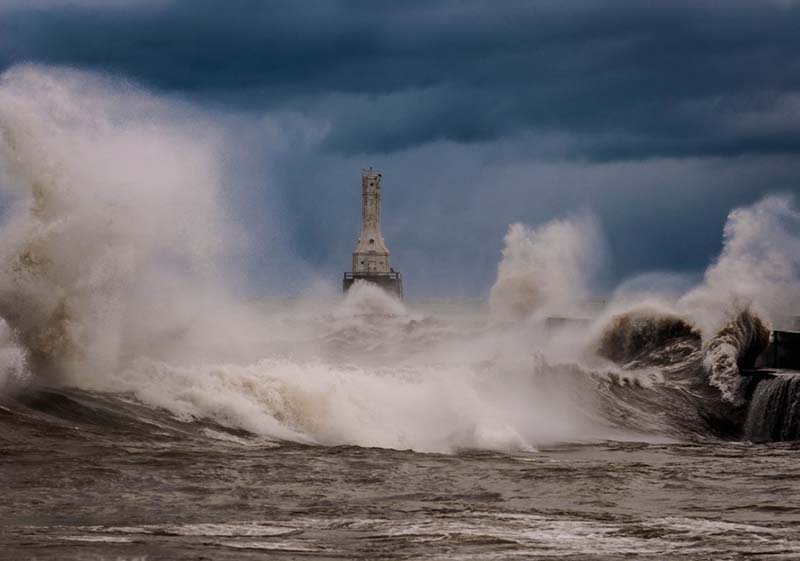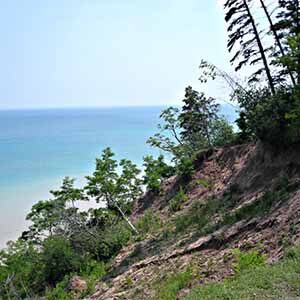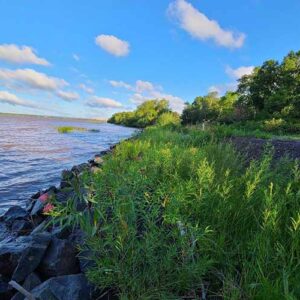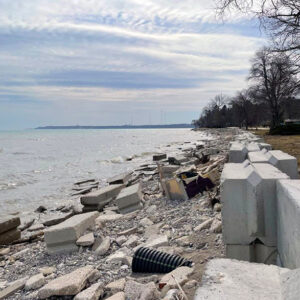Read this in Spanish / lee esto en español
A focus on climate impacts to Wisconsin’s Great Lakes coastal communities in the most recent assessment from the Wisconsin Initiative on Climate Change Impacts (WICCI) shows that large fluctuations in Great Lakes water levels along with flooding and bluff erosion from extreme storms are impacting the areas along Wisconsin’s Lake Michigan and Lake Superior coastlines and causing uncertainty for coastal communities. The last two decades have been the warmest on record in Wisconsin, and the past decade has been the wettest.
All of Wisconsin’s Lake Michigan and Lake Superior coasts experienced extreme lake level fluctuations in the past decade. Along Lake Michigan, record high water levels in 2020 followed record low water levels in 2013. At low water levels, coastal-dependent industries are at risk for insufficient water depths for navigation. At high water levels, concerns include increased erosion, flooding, bluff failure, and infrastructure damage. Both high and low water level extremes are anticipated under a changing climate along the Great Lakes coastline.

This could include potentially higher highs, lower lows, and more rapid fluctuations than seen in the historical record. The high variability in water levels combined with bigger waves and storm surge from extreme storms will continue to increase erosion and decrease the stability of coastal bluffs.
Wave energy reaching Great Lakes coasts is expected to increase in the future, in part due to anticipated decreases in ice cover extent and duration. Ice cover on the Great Lakes is declining as air temperatures rise. Nine of the top 10 lowest ice cover years have occurred since 2002. Projections show that ice cover duration on Lake Superior will decrease by one to two months by the end of the century as the climate continues to warm.
Greater wave energy reaching the coast will lead to increased erosion and flooding of the shoreline. During times of higher water levels, these large waves will be able to reach further inland and cause greater coastline erosion and flooding. In some coastal communities, the areas with the highest risk of coastal flooding are also home to low income and other vulnerable populations.
To adapt to a changing coast, communities can explore approaches to build resilience and seek to incorporate nature-based solutions. The WICCI Coastal Resilience Working Group has resources to help. There is hope for the future but it’s up to us.
This article is part of a series highlighting the contribution from each WICCI Working Group for the 2021 WICCI Assessment Report.
Coastal Resilience Working Group - Stories
Support WICCI
Gifts to the Wisconsin Initiative on Climate Change Impacts (WICCI) Program Fund provide general, discretionary program support and are used to enhance and expand WICCI’s teaching, research, and public service roles. Gifts are also used to support partnership-building activities, include faculty, staff, and student recruitment, retention, and morale.
The Wisconsin Initiative on Climate Change Impacts (WICCI) is a statewide collaboration of scientists and stakeholders formed as a partnership between UW–Madison’s Nelson Institute for Environmental Studies and the Wisconsin Department of Natural Resources. WICCI’s goals are to evaluate climate change impacts on Wisconsin and foster solutions.


